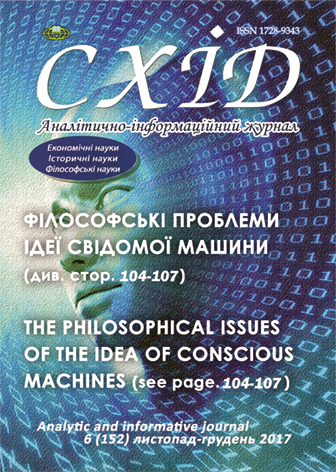Sedentarism and nomadism in modern humanitarian discourse: from stereotypical perception to explanation
DOI:
https://doi.org/10.21847/1728-9343.2017.6(152).195545Keywords:
nomadism, sedentarism, discourse, environmentAbstract
The concepts of sedentarism and nomadism in contemporary humanitarian discourse have been studied from the viewpoint of their explanation instead of stereotypical perception. Nomadism is supposed to have been perceived by researchers mainly from negative perspectives, thus the author has studied other approaches to understanding nomads. Nomads proved to have their own history, complex forms of social life and social institutions, although they contributed to the transcontinental circulation of goods and artifacts, the transmission of cultural values, innovations and their governing institutions to other cultures, and the unification of sedentary worlds into a single planetary environment.Downloads
References
Akatay, S. N. (1998). Filosofiya tengrizma. In: Kazakhstanskaya filosofiya v kanun XXI veka (materialy Respublikanskoy nauchno-teoreticheskoy konferentsii, posvyashchennoy 40-letiyu Instituta filosofii MN-AN RK, 28 maya 1998 g.). Almaty: Akyl kítaby, 251 p. (rus)
Alzhan, K. U. (2013). Mirovozzrencheskiye i kontseptualno-metodologicheskiye osnovaniya interpretatsii fenomena nomadizma. Voprosy filosofii. 3: 39-49. (rus)
Borodin, S. A. (2001). Gryadushchaya tsivilizatsiya «novykh kochevnikov». Obozrevatel. 4 (135). Available at: http://staretz.narod.ru/publish/nac_bez_i_geopolitika/novie_kochevniki.htm (rus)
Borodin, S. A. (2011). Klich za Rus Vedicheskuyu! In: Natsionalnaya bezopasnost i geopolitika Rossii. Moscow: Shemshuk i K, 208 p. (rus)
Borodin, S. A. (2010). Religiozno-dukhovnyye otpravleniya nomadizma. Available at: http://staretz.narod.ru/Rounu/religya_nomadov.htm (rus)
Gumilov, L. N. (2001). Etnogenez i biosfera Zemli. St.Petersburg: Kristall, 642 p. (rus)
Danilevskiy, N. Ya. (1995). Rossiya i Yevropa: Vzglyad na kulturnyye i politicheskiye otnosheniya Slavyanskogo mira k Germano-Romanskomu. St.Petersburg : Glagol, 552 p. (rus)
Dudchenko, V. (2013). Dukhovnost i nomadizm v perspektive dukhovnoy koevolyutsii chelovechestva. Studia Universitati Moldaviae. Revistă Ştiinţifică a Universităţii de Stat din Moldova. № 4 (64): 106-110.
Isayev, K. (2002). Tsivilizatsiya kochevnikov: unikalnost fenomena i ob yego vklade v razvitiye mirovoy tsivilizatsii. Çankırı Karatekin Üniversitesi Uluslararası Avrasya Strateji Dergisi. 2 (2): 29-40. Available at: https://arastirmax.com/tr/system/files/dergiler/169983/makaleler/2/2/arastirmax-gocebe-uygarligi-konar-gocer-fenomeni-dunya-uygarliginin-gelismesine-katkisi.pdf
Karabayev, E. (2010). Mir nomadizma: proshloye i budushcheye. Available at: http://www.mfa.kg/articles/ (rus)
Kasymzhanov, A. Kh. (2001). Prostranstvo i vremya velikikh traditsiy. Almaty: KazNU, 301 p. (rus)
Klimova, S. V. (2002). Sotsialno-filosofskiye aspekty analiza arkhetipicheskikh funktsiy doma. Anthropology. Available at: http://anthropology.ru/ru/text/klimova-sv/socialno-filosofskie-aspekty-analiza-arhetipicheskih-funkciy-doma (rus)
Knysh, I. V. (2017). Conceptualization of nomadism and sedentarism in hyphspace: modern socio-cultural discourse. Skhid, №5(151): 78-82. DOI: https://doi.org/10.21847/1728-9343.2017.5(151).195543 (ukr)
Knysh, I. V. (2017). Peredumovy vynyknennya nomadyzmu ta yikh eksplikatsiya u suchasnomu humanitarnomu dyskursi. Science and society: collection of scientific articles. Roma, Italy, Р. 370-375. (ukr)
Knyazeva, Ye. N. (2005). Tvorcheskiy put Frantsisko Varelly: ot teorii avtopoezisa do novoy kontseptsii v kognitivnoy nauke. Voprosy filosofii. № 8. S. 91-104. (rus)
Kodar, A. (2002). Stepnoye Znaniye: ocherki po kulturologii. Astana: Foliant, 208 p. (rus)
Kochubey, N. (2013). Sinergeticheskiye kontsepty v nelineynykh kontekstakh: seti, upravleniye, obrazovaniye. Saarbrûcken, Deutschland: Palmarium Academic Publishing, 260 p. (rus)
Masanov, N. E. (1955). Kochevaya tsivilizatsiya kazakhov: osnovy zhiznedeyatelnosti nomadnogo obshchestva. Almaty: Sotsivest-Gorizont, 270 p. (rus)
Nurzhanov, B. G. (1994). Kulturologiya: kurs lektsiy. Almaty: Un t «Kaynar», 128 p. (rus)
Popova, I. P. (2000). Evolyutsiya ponyatiya marginal'nosti v istorii sotsiologii. In: Marginalnost v sovremennoy Rossii. Moscow: MONF, 208 p. (rus)
Suleymenov, O. O. (2000). Filosofskiye problemy kultury. URL: www.kros.ru
Toynbee, A. (1991). Postizheniye istorii (Comprehension of history, translat. from English). Moscow: Progress, 736 p. (rus)
Khazanov, A. M. (2002). Kochevniki i vneshniy mir. Almaty: Dayk-Press, 604 p. (rus)
Downloads
Published
How to Cite
Issue
Section
License
Copyright (c) 2018 Inna Knysh

This work is licensed under a Creative Commons Attribution-NonCommercial-NoDerivatives 4.0 International License.
1. Authors bear responsibility for the accuracy of facts, quotations, numbers and names used.
2. Manuscripts are not sent back.
3. The publisher does not always agree with the authors' opinion.
4. The authors reserve the right to authorship of the work and pass the first publication right of this work to the journal under the terms of a Creative Commons Attribution-NonCommercial-NoDerivatives 4.0 International License. This license allows others to distribute (copy) the published work for non-commercial purposes, provided there is mandatory attribution to its authors and a link to the first publication in our journal.
5. The authors have the right to conclude separate supplement agreements that relate to non-exclusive work distribution in the form in which it has been published by the journal (for example, to upload the work to the online storage of the journal or publish it as part of a monograph), provided that the reference to the first publication of the work in this journal is included.

